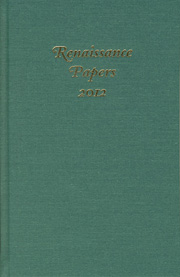Book contents
- Frontmatter
- Contents
- Dedication
- Reconstructing the Bower of Bliss: Homoerotic Myth-Making in The Faerie Queene
- Ovid, Lucretius, and the Grounded Goddess in Shakespeare's Venus and Adonis
- The Soul as Commodity: Materialism in Doctor Faustus
- Antipholus and the Exorcists: The Acts of the Apostles in Shakespeare's The Comedy of Errors
- Paul's Cross Churchyard and Shakespeare's Verona Youth
- The Summoning of Hamlet and Lear
- “Bred Now of Your Mud”: Land, Generation, and Maternity in Antony and Cleopatra
- Cosmetic Blackness: East Indies Trade, Gender, and The Devil's Law-Case
- From One Marvell to Another: Puritan Logic in “To His Coy Mistress”
- “An Heap Is Form'd into an Alphabet”: Thomas Blount's Sociable Lexicography
- Getting Past the Ellipsis: The Spirit and Urania in Paradise Lost
Antipholus and the Exorcists: The Acts of the Apostles in Shakespeare's The Comedy of Errors
Published online by Cambridge University Press: 05 December 2013
- Frontmatter
- Contents
- Dedication
- Reconstructing the Bower of Bliss: Homoerotic Myth-Making in The Faerie Queene
- Ovid, Lucretius, and the Grounded Goddess in Shakespeare's Venus and Adonis
- The Soul as Commodity: Materialism in Doctor Faustus
- Antipholus and the Exorcists: The Acts of the Apostles in Shakespeare's The Comedy of Errors
- Paul's Cross Churchyard and Shakespeare's Verona Youth
- The Summoning of Hamlet and Lear
- “Bred Now of Your Mud”: Land, Generation, and Maternity in Antony and Cleopatra
- Cosmetic Blackness: East Indies Trade, Gender, and The Devil's Law-Case
- From One Marvell to Another: Puritan Logic in “To His Coy Mistress”
- “An Heap Is Form'd into an Alphabet”: Thomas Blount's Sociable Lexicography
- Getting Past the Ellipsis: The Spirit and Urania in Paradise Lost
Summary
In act 4 of The Comedy of Errors, Adriana, in response to her husband's wildly erratic behaviour, recruits one Doctor Pinch to cure his apparent madness. Antipholus of Ephesus is of course not really mad at all, but understandably frustrated and confused with the events of the day, which have seen him locked out of his own house and accused of failing to pay for valuables that he actually never received, thanks to a series of misunderstandings involving his identical twin, Antipholus of Syracuse. When Antipholus of Ephesus refuses to cooperate with his wife's well-intentioned intervention, Doctor Pinch attempts an exorcism to drive away the demons which he supposes to possess him:
I charge thee, Satan, housed within this man,
To yield possession to my holy prayers
And to thy state of darkness hie thee straight:
I conjure thee by all the saints in heaven!
Of course, Pinch's attempted exorcism fails, because there is no Satan to exorcise, and Antipholus becomes so angry that Adriana has him forcibly bound and taken away in Pinch's custody. In a later scene a messenger reports that Antipholus and his servant Dromio have gnawed through their bonds and escaped and then captured and tormented the hapless Doctor Pinch, burning off his beard “with brands of fire,” putting it out again with “Great pails of puddled mire,” and then preaching patience to him while cutting him with scissors and concludes that “unless you send some present help, / Between them they will kill the conjurer” (5.1.172, 74–76, 177–78).
- Type
- Chapter
- Information
- Renaissance Papers 2012 , pp. 31 - 40Publisher: Boydell & BrewerPrint publication year: 2013

